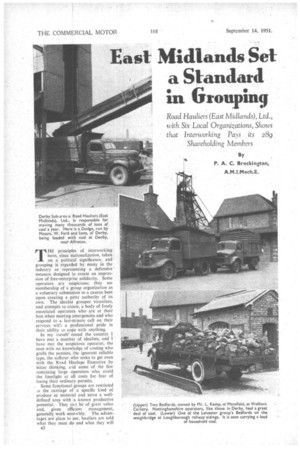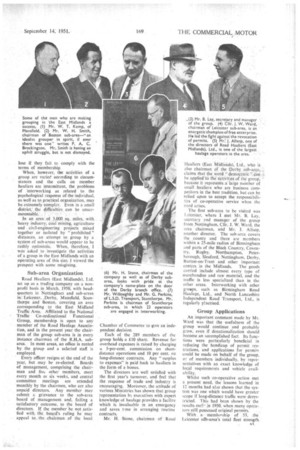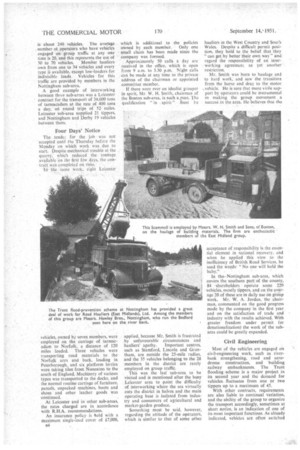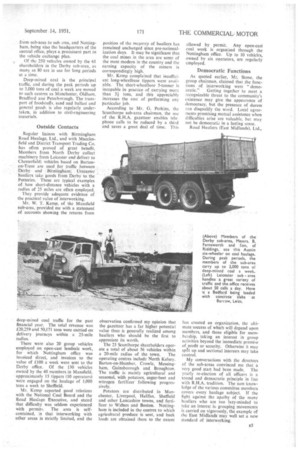East Midlands Set a Standard in Grouping
Page 36

Page 37

Page 38

Page 39

If you've noticed an error in this article please click here to report it so we can fix it.
Road Hauliers (East Midlands), Ltd., with Six Local Organizations, Shows that Interworking Pays its 289 Shareholding Members By P. A. C. Brockington, A.M.I.Mech.E.
Derby Sub-area o. Road Hauliers (East Midlands), Ltd., is responsible for moving many thousands of tons of coal a year. Here is a Dodge, run by Messrs. W. Ford and Sons, of Derby, being loaded with coal at Denby, near Alfreton.
THE principles of interworking have, since nationalization, taken on a political significance, and grouping is regarded by many in the industry as representing a defensive ' measure designed to create an impression of free-enterprise solidarity. Some operators are suspicious; they see membership of a group organization as a voluntary submission to a caucus bent upon creating a petty authority of its own. The idealist grouper visualizes, and attempts to create, a body of freely associated operators who are at their best when meeting emergencies and who respond to a last-minute call on their services with a professional pride in their ability Lo cope with anything.
In my travels round the country I have met a number of idealists, and I have met the suspicious operator, the man with no knowledge of costing who grabs the pennies, the ignorant reliable type, the sufferer who seeks to get even with the Road Haulage Executive by bitter thinking, aid some of the few remaining large operators who avoid the limelight at all costs for fear of losing their ordinary permits.
Some functional groups are restricted :0 the carriage of a specific kind of produce or material and serve a welldefined area with a known productive potential. They cal be of great value and, given efficient management, generally work smoL.:111y. The advantages are plain to see, hauliers are told what they must do and what they will B2
Some of the men who are making grouping in the East Midlands a success; (1) Mr. W. T. Kemp, of Mansfield. (2) Mr. W. H. Smith, chairman of Boston sub-area—" an idealist grouper in spirit, if ever there was one" writes P. A. C. Brockington. Mr. Smith is having an uphill struggle, but is not dismayed.
lose if they fail to comply with the terms of membership When, however, the activities of a group are varieco according to circumstances and the calls on member hauliers are intermittent, the problems of interworking as related to the psychological response of the individual. aswell as to practical organization, may be extremely complex. Even in a small district; the difficulties can be unsur mountable. ' s • In an a,rea .ot 3.000 sq. miles, with • heavy industry; coal mining, agriculture and civil-engineering projects mixed together or isolated by " prohibited " distances, an attempt to group by a system of sub-areas would appear to be rashly optimistic. When, therefore, I was asked to investigate the activities of a group in the East Midlands with an operating area of this size. I viewed the prospect with some misgiving.
Sub-area Organization
Road Hauliers (East Midlands), Ltd. set up as a trading company on a nonprofit basis in March, 1950, with headquarters in Nottingham and sub-areas in; Leicester, _Derby, Mansfield, Scunthorpe and Boston, covering an area corresponding to the East Midland Traffic Area. Affiliated to the National Traffic Co-ordinational Functional Group, membership is open to any member of the Road Haulage Association, and in the present year the chairman of the group sub-area is in every instance chairman of the R.H.A. subarea. In most areas, an office is rented by the group and a salaried staff is employed.
Every officer resigns at the end of the year, but may be re-elected. Boards of management, comprising the chairman and fivt, other members, meet every month or six weeks, and central committee meetings are attended monthly by the chairmen, who are also unpaid directors. Any member may submit a grievance to the sub-area board of management and, failing a satisfactory outcome, to the board of directors. If the member be not satisfied with the bnard's ruling he may appeal to, the , ettairman. of the local•
Chamber of Commerce to gsve an independent decision.
Each of the 289 members of the group holds a flO share. Revenue for overhead expenses is raised by charging a 5-per-cent. commission on shortdistance operations and 10 per cent. on long-distance contracts. Any " surplus to expenses" is paid back to hauliers in the form of a bonus.
The directors are well satisfied with the first year's turnover, and feel that the response of trade and industry is encouraging. Moreover, the attitude of various Ministries has shown that group representation hs executives with expert knowledge ot haulage provides a facility which is invaluable in an emergency and saves t.me in arranging routine contracts.
Mr. H. Stone, chairman of Road
'Hauliers (East Midlands), Ltd.. who is also chairman of the -Derby sub-area, .2 claims that the word ---democratic -.can be ariplied to the activities of the group, because it represents a large number of small hauliers who are business competitors in the.best tradition, but can be relied upon to accept the responsibilities of co-operative service when the need arises.
The first sub-area to be visited was Leicester, where I met Mr. 13. Lay, secretary and manager of the group from Nottingham, air. J. W. Ward, the area chairman, and Mr. J. Allsop, another director. The sub-area covers the county and there are members within a 25-mile radius of Birmingham and parts of the Black Country, Coventry, Rugby, Northampton, Peterborough, Sleaford, Nottingham, Derby, Burton-on-Trent and other important centres in the Midlands. The goods carried include almost every type of merchandise and raw material, and the traffic is less specialized than in the other areas. Interworking with other groups, such as Birmingham Road Haulage, Ltd._ and North Lancashire Independent Road Transport, Ltd., is regularly p'eactised.
Group Applications
An important comment made by Mr. Ward was that the usefulness of the group would continue and probably grow, even if denationalization should become an accomplished fact. Its functions were particularly beneficial in reducing the handicap of permit restrictions, and applications for permits could be made on behalf of the group, or of members individually, by representatives with an exact knowledge of local requirements and vehicle availability.
Whilst such co-operative action met a present need, the lessons learned in 12 months had alio shown that the system was one which would have greater scope if long-distance traffic were derestricted. This had been shown by the results,earle in 1950, when many opera tors still possessed original permits. , With , . membership of 53, the Leicester sib-area's total fleet strength.
is about 240 vehicles. The average number of operators who have vehicles engaged on group traffic at any one time is 20, and this represents the use of 30 to 70 vehicles. Member hauliers own from one to 34 vehicles and every type is available, except low-loaders for indivisible loads. Vehicles for this traffic are provided by members in the Nottingham sub-area.
A good example of interworking between three sub-areas was a Leicester ' contract for the transport of 34,000 tons of tarmacadam at the rate of 400 tons a day, on round trips of 52 miles. Leicester sub-area supplied 21 tippers, and Nottingham and Derby 19 vehicles between them.
Four Days' Notice
The tende: for the job was not accepted until the Thursday before the Monday on which work was due to start. Despite mechanical trouble at the quarry, which reduced the tonnage available on the first few days, the contract was completed on time.
In the same week, eight Leicester
vehicles, owned by seven members, were employed on the carriage of tarmacadam to Norfolk, a distance of 120 miles loaded. Three vehicles were transporting road materials to theNorfolk ares and back, loading in Peterborough, and six platform lorries were taking tiles from Nuneaton to the south of England. Machinery of various types was transported to the docks, and the normal routine carriage of furniture, parcels, unpacked machines, boots and shoes and other leather goods was continued.
At Leicester and in other sub-areas, the rates charged are in accordance with R.1-1.A. recommendations.
An insurance policy is 1teld with a maximum single-:oad cover 0f E7,000,
which is additional to the policies owned by each member. Only one small claim has been made since the company was formed.
Approximately 50 calls a day are received in the office, which is open from 9 a.m. to 5.30 p.m. Night calls can he made at any time to the private • address of the chairman or appointed committee member.
If there were ever an idealist grouper in spirit, Mr. W. H. Smith, chairman of the Boston sub-area, is such aernan. The qualification " in spirit" enust applied, because Mr. Smith is frustrated by unfavourable circumstances and
hauliers' apathy. Important centres, such as Stamford, Lincoln and Grantham, are outside the 25-mile radius, and the 35 vehicles belonging to the 28 members in the district are rarely employed on group traffic.
This was the last" sub-area to be visited and is mentioned after the busy Leicester area to point the difficulty of interworking where the sea virtually cuts the district in halves and the main operating base is isolated from industry and consumers of agricultural and market-garden produce.
Something must be said, however, regarding the attitude of the operators, which is similar to that of some other hauliers in the West Country and South Wales. Despite a difficult permit position, they hold to the belief that they
can get by better their own way" and regard the responsibility of an inter-working agreemen: as yet another restriction.
Mr. Smith was born to haulage and to hard )sork, and saw the transition from the horse and dray to the motor „vehicle. He is sure that more virile support by operators could be instrumental in making the group movement a success in the area. He believes that the
acceptance of responsibility is the essential element in national recovery, and when he applied this view to the inefficiency of British Road Services, he used the words: "No one will hold the baby."
In theNottingham sub-area, which covers the southern part of the county, ; 84 shareholders operate some 220 vehicles, mostly tippers, and on the average 20 of these are in daily use on gfolip work. Mr. W. A. Jordan, the chairman, commented on the good progress made by the company in the first year and on the satisfaction of trade and industry with the results achieved. With greater freedom under permit (or denationalization) the work of the subarea could be greatly expanded.
Civil Engineering
Most of the vehicles are engaged on civil-engineering work, such as riverbank strengthening, road and aerodrome construction, and building railway embankments. The Trent flooding-scheme is a major project in its second year and the demand for vehicles_ fluctuates from one or two tippers up to a maximum of 45.
With other contracts, requirements are also liable to continual variation, and the ability of the group to organize the transport accordingly, sometimes at short notice, is an indication of one of its most important functions. As already indicated, vehicles are often switched from sub-area to sub arca, and Nottingham, being also the headquarters of the central office, plays a prominent part in the vehicle exchange plan.
Of the 250 vehicles owned by the 61 shareholders in the Derby sub-area, as many as 80 are in use for long periods at a time.
Deep-mined coal is the principal traffic, and during the peak periods up to 3,000 tons of coal a week are moved to such centres as Manchester, Oldham, Bradford arra Peterborough. The transport of foodstuffs, sand and ballast and general goods is also regularly undertaken. in addition to civil-engineering materials.
Outside Contacts
Regular liaison with Birmingham Road Haulage, Ltd., and with Macclesfield and District Transport Trading Co. has often proved of great benefit. Members from North Derby collect machinery from Leicester and deliver to Chesterfield; vehicles based on Burtonon-Trent are used for traffic between Derby -and Birmingham; Uttoxeter hauliers take goods from Derby to the Potteries. These are typical examples of how short-distance vehicles with a radius of 25 miles are often employed.
They provide adequate evidence of the practical value of interworking.
Mr. W. T. Kemp, of the Mansfield sub-area, provided me with a statement of accounts showing the returns from deep-mined coal traffic for the past financial year. The total revenue was £20,259 and 50,171 tons were carried on delivery journeys within a 25-mile radius.
There were also 20 group vehicles employed on open-cast landsale work, for which Nottingham office was invoiced direct, and invoices to the value of £100 a week were sent to the Derby office. Of the 130 vehicles owned by the 40 members in Mansfield, approximately 15 tippers (10 operators) were engaged on the haulage of 1,000 tons a week to Sheffield.
Mr. Kemp reported good relations with the National Coal Board and the Road Haulage Executive, and stated that difficulty was seldom experienced with permits. The area is selfcontained, in that interworking with other areas is strictly limited, and the position of the majority of hauliers has remained unchanged since pre-nationalization days. It may be significant that the coal mines in the area are some of the most modern in the country and the earning capacity of the miners is correspondingly high.
Mr. Kemp complained that insufficient long-wheelbase tippers were available. The The short-wheelbase 5-tonner is incapable in practice of carrying more than 3i tons, and this appreciably increases the cost of performing any particular job.
According to Mr. G. Perkins, the Scunthorpe sub-area chairman, the use of the R.H.A. gazetteer enables telephone calls to be reduced by a third and saves a great deal of time. This observation confirmed my opinion that the gazetteer has a far higher potential value there is generally realized among hauliers who should be the first to appreciate its worth.
The 23 Scunthorpe shareholders operate a total of about 56 vehicles within a 20-mile radius of the town. The operating centres include North Kelsey, Barton-on-Humber, Crowle, Messingham, Gainsborough and Broughton. The traffic is mainly agricultural and seasonal, with potatoes, sugar-beet and nitrogen fertilizer ' following progressively.
Potatoes are distributed in Manchester, Liverpool, Halifax, Sheffield and other Lancashire towns, and fertilizer to Widnes and Boston. Nottingham is included in the centres to which agricultural produce is sent, and back loads are obtained there to the extent allowed by permit. Any open-cast coal work is organized through the Nottingham office. Up to 10 vehicles, owned by six operators, are regularly employed.
Democratic Functions
As quoted earlier, Mr. Stone, the group chairman, claimed that the functions of interworking were "demo
cratic." Getting together to meet a recognizable threat to the community's existence may give the appearance of democracy, but the presence of duress can disqualify the word. Local agreements promising mutual assistance when difficulties arise are valuable, but may not be democratie in a lasting sense.
Road Hauliers (East Midlands), Ltd., has created an organization, the ultimate success of which will depend upon members, and those eligible for membership, taking an interest in group activities beyond the immediate promise of profit or security. Otherwise it may spht up and sectional interests may take control.
My conversations with the directors of the sub-areas convinced me that a very good start had been made. The yearly re-election of all officers is a sound and democratic principle in line with R.H.A. tradition. The sum knowledge of the various committee members covers every haulage subject. If the fight against the apathy of the many ha uliers who are too lazy-minded to take an interest in grouping movements is carried on vigorously, the example of the East Midlands may well set a new standard Of interworking.




















































































